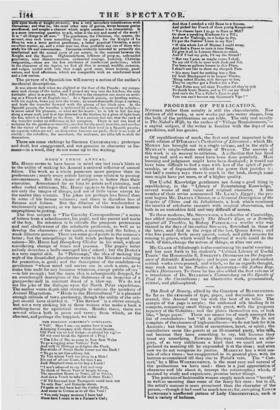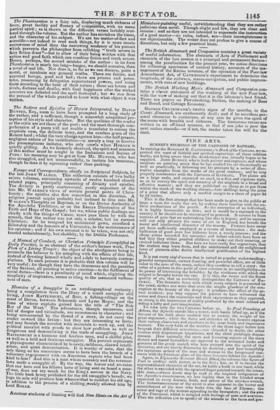The Book of Beauty, edited by the Countess of BLESSINGTON.
So far as the externals of type, paper, and decoration are con-
cerned, this Annual may vie with the best of its tribe. The margin of the page is ample ; the embossed silk binding fit to compete, comparing small things with great, with the gorgeous tapestry of the Gobelins; and the plates themselves are, or look like, " large paper." There are names too of mark amongst the list of contributors: but "all is glittering show." We do not
complain of theabsence of high excellence—we do not look for it in Annuals ; but there is little of earnestness, heart, or spirit ; the contributors seem like guests at an ill-assorted party, who talks not because they have something to say, but because they must say something. EDWARD BULWER contributes an alle- gory, of so very infelicitous a kind that wo could not com- prehend its meaning till he expounded it at the close; and even now we do not recognize its justice. MARRYAT has a wild sea- tale of other times ; but exaggerated in its general plan, with its horrors accumulated till they rise to Pistol's vein. The " Con- cert," by a Miss WORTHINGTON, is the most easy and natural of the productions we have read : there is a just appreciation of character and life about it, (except the catastrophe,) which, if assisted by study and experience, promise better things.
The portraits of fashionable women supply much more "beauty" as well as meaning than some of the fancy fair ones : but in all, the artist's manner is more prominent than the character of the
Lperson,—though it had need be much less so; for, excepting E owl X ANDSEER'S unaffected picture of Lady CHESTERFIELD, each is but a variety of badness.
The Phantasmion is a fairy tale, displaying much richness of fancy, great facility and fluency of composition, with no mean poetical spirit ; as is shown in the different verses lavishly scat- tered through the volume. But the author has mistaken the times, and the character of his subject. We are too matter-of-fact and scientific—not indeed to read such things, for it is more innate narrowness of mind than the narrowing tendency of his pursuit which prevents the philosopher from relishing " truth severe in fairy fiction drest"—but to allow of their being written with that nature and good faith which can combine fiction and truth severe. Hence, perhaps, the second mistake of the author : in its form Phantasmion is much too long—longer, we should conceive, than a novel of real life. Nor does it, so far as we can discern, point a moral, or inculcate any general truths. There are fairies, and supernal beings, good and bad ; there are princes and poten- tates, possessing by delegation supernatural powers, and using them according to the bent of their nature; there are lovers and rivals, distress and deaths, with final happiness after the wicked sorcerers are defeated and the spell destroyed ; but we rise from the perusal of the whole puzzled to know with what object it was written.



























 Previous page
Previous page